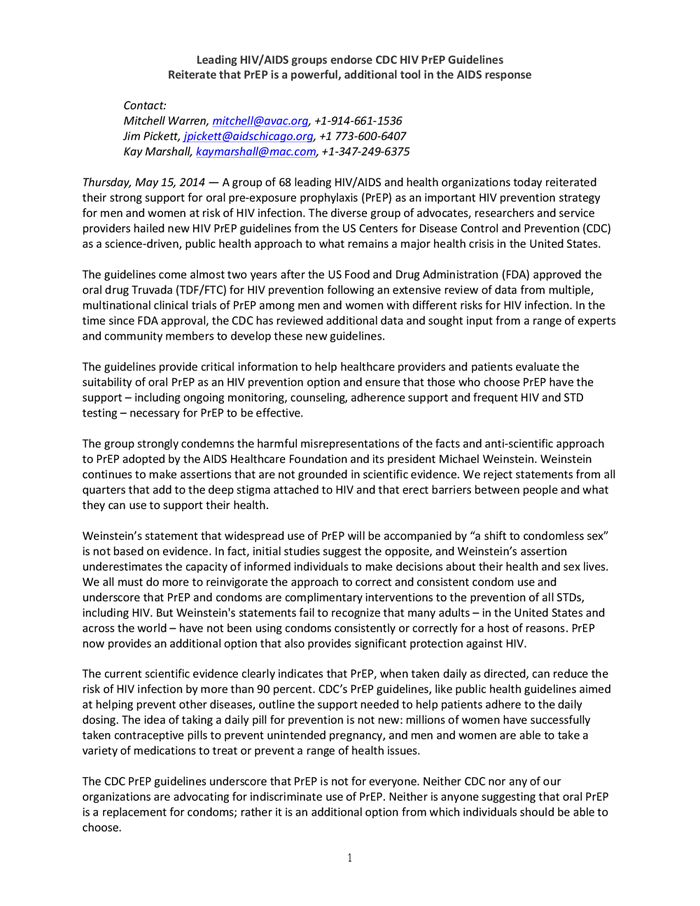
Sixty-eight of the nation's leading HIV/AIDS healthcare organizations have endorsed new U.S. federal health guidelines saying doctors should consider a daily drug, which has been shown to prevent HIV infection, for patients at "substantial risk."
The Centers for Disease Control and Prevention (CDC), in its new guidelines to doctors, said Wednesday that pre-exposure prophylaxis, or PrEP, could reduce HIV infection rates when taken daily as directed. Some advocates say the guidelines will dramatically change the way primary doctors and clinicians address the risk of HIV infection with HIV-negative patients and provide confidence to health care providers in prescribing the pill.
When taken daily, PrEP, manufactured by Gilead Sciences with the market name of Truvada, has been shown to reduce HIV infection by 90%. "PrEP, used along with other prevention strategies, has the potential to help at-risk individuals protect themselves and reduce new HIV infections in the U.S.," said CDC Director Tom Frieden, M.D., in a statement. Currently, new HIV infections are at 50,000 per year.
In the letter endorsing the decision, the organizations hailed the CDC guidelines as "critical information to help healthcare providers and patients understand the suitability of oral PrEP as an HIV prevention option and ensure that those who choose PrEP have the support – including ongoing monitoring, counseling, adherence support and frequent HIV and STD testing – necessary for PrEP to be effective."
Among the organizations represented in the letter are the AIDS Foundation of Chicago, Gay Mens Health Crisis, and San Francisco AIDS Foundation, among others.
"The guidance makes this a standard for primary care, not just for HIV doctors," said Dr. Demetre Daskalakis, medical director of Ambulatory HIV Services at Mount Sinai Hospital in New York City who serves on the board of GMHC, in an interview with BuzzFeed. "Ultimately, the subtext is that health care providers need to have a frank conversations with patients to see if they are at risk."
The extensive new guidelines, in summary, tell doctors to consider the drug for patients who are in a sexual relationship with an HIV-infected partner; gay and bisexual men who have condomless sex; heterosexual men and women with sexual partners at high risk such as injection drug users or bisexual men; and anyone who uses injection drugs or shares needles. The guidelines also say that patients should be tested for HIV before being prescribed the regimen.
Much of the focus among advocates for PrEP has been on gay men, who are at the highest risk, according to Jim Pickett, director of Prevention Advocacy and Gay Men's Health at the AIDS Foundation of Chicago. "It's been framed with gay men because that's where a new intervention is needed," he said. Unprotected sex among men who have sex with men increased between 2005 and 2011, according to a November 2013 report from the CDC. However, the drug is yet to catch on, with the CDC estimating that fewer than 10,000 have been prescribed the regimen, which it said could rise to 500,000 under the new guidance.
The new guidelines come two years after Truvada was approved by the U.S. Food and Drug Administration as a method for HIV prevention in combination with safer sex practices and builds on interim guidance previously issued by the CDC on PrEP for men who have sex with men, people who inject drugs, and heterosexuals at risk.
Taking Truvada as PrEP is no small commitment, considering it must be taken daily and patients must check in with their medical providers every three months. Additionally, the pill costs $15,000 per year in the U.S., but most insurers usually cover the drug and Gilead offers financial assistance to patients in need who may not be covered by insurance.
The numerous organizations also condemned what they view as "harmful misrepresentations" of PrEP by Michael Weinstein, president of the AIDS Healthcare Foundation, who has long been critical of prescribing the drug for HIV prevention and, as a result, come under fire for those views.
In a statement Wednesday, Weinstein said the CDC "abandoned a science-driven, public health approach to disease prevention" and that the guidelines "will likely have catastrophic consequences in the fight against AIDS in this country."
"What about other STDs like syphilis, which has seen a resurgence approaching epidemic proportions in some of the same communities that the CDC wants to target for PrEP?" Weinstein said. "Despite CDC and FDA requirements for risk-reduction counseling and condom use while taking PrEP, the government-sanctioned widespread deployment of PrEP will be accompanied with a shift to condom-less sex. The CDC would be better advised to put its weight behind HIV testing and linkage to treatment for the estimated 20% of the 1.3 million people living with HIV in this country today who have never been tested for the disease."
The signing organizations contend that Weinstein's views "are not based in science," and said that none are advocating for PrEP to replace condoms.
"The CDC PrEP guidelines underscore that PrEP is not for everyone," the letter states. "Neither CDC nor any of our organizations are advocating for indiscriminate use of PrEP. Neither is anyone suggesting that oral PrEP is a replacement for condoms; rather it is an additional option from which individuals should be able to choose."
As for the next step following the CDC guidelines, health advocates like Pickett say organizations and health officials must now help doctors implement information in their practices so that people who are in need of PrEP will get it.
"So we have this wonderful set of guidance, this great road map," says Pickett. "And now we really have to work hard to make sure that PrEP is implemented smartly and strategically and that we're getting it to the people who most need it."
The AIDS Healthcare Foundation said Weinstein was out of the country Thursday. A message was left with his assistant seeking additional comment.

